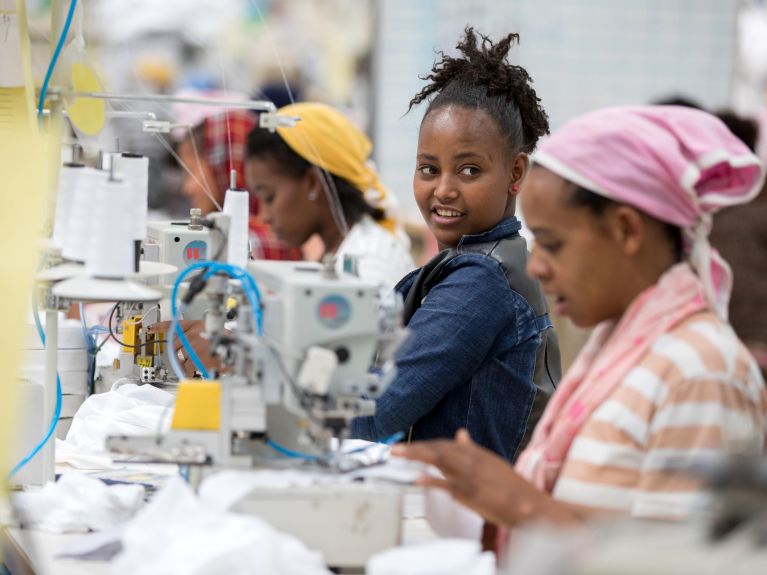Jobs miracle in Africa
The textile industry in Ethiopia is booming – thanks too to German companies.

Germany. According to a report in the current issue of “akzente”, the magazine of Deutsche Gesellschaft für Internationale Zusammenarbeit (GIZ), “the textile industry in Ethiopia is booming”. Some 350,000 jobs are going to be created by 2022. To this end, the government is having industrial parks built. “In Hawassa, a city with 300,000 inhabitants around 270 kilometres south of the capital Addis Ababa, the plan has already borne fruit. Eighteen international textile companies have set up shop there, and 20,000 jobs have been created.”
One of the first companies to commit to Ethiopia has been Tchibo. In the past few years the Hamburg-based coffee roaster has also become the world’s third-largest seller of organic cotton. On the company website there are numerous reports about its commitment to Africa – for example about the work departmental head Kokobe Urga does. At Tchibo’s supplier Ayka Addis Textile in the Ethiopian capital Addis Ababa she runs a department with 200 staff members and has worked her way up from unskilled helper to head of department.
According to company information, 6,000 employees of the supplier Ayka Addis Textile are involved in the manufacture of Tchibo products. At the branch in Addis Ababa the ginned cotton is spun, meshed, coloured, sewn together as textiles, and packaged. From the outset Tchibo helped the local company, the first producer of textiles for export in Ethiopia, to establish fair working conditions. Alongside opportunities for promotion for the textile workers, the benefits at Ayka include unionised worker representation, free lunches, free transport to the factory and basic on-site medical care.
We believe in Africa’s future
The German textile company KiK is also committed to Ethiopia, though for somewhat different reasons. Given increased demand, the company was looking for an addition to the Asian procurement markets, the textile discounter says. In 2017 it quadrupled its purchasing volume in Africa. Last year KiK imported around 12 million cotton T-shirts, leggings, jeans and softshell jackets from Ethiopia, Rwanda, Kenya, and Egypt. Furthermore, in order for the company’s standards to be met, 2,000 textile workers were trained in Africa. CEO Patrick Zahn says that one of the reasons for his company’s commitment to Africa was the intention to motivate people to stay there. “We believe in the future of the African continent, while at the same time we see it as our responsibility to support the Africa initiative of the Federal government,” Zahn says.
There are various reasons for the boom in Ethiopia. One the one hand, wages in Asian countries such as China have risen considerably, while on the other, employers rate highly the fact that Ethiopia has a long tradition of textile manufacturing, both traditional weaving and industrial production. Moreover, the energy costs are low, the transport routes to Europe short, and the political situation in Ethiopia is stable.
Dieses YouTube-Video kann in einem neuen Tab abgespielt werden
YouTube öffnenThird party content
We use YouTube to embed content that may collect data about your activity. Please review the details and accept the service to see this content.
Open consent formAlthough to date only 0.01 per cent of clothing exports worldwide are from Ethiopia, the sector is growing quickly. According to a McKinsey study, in the next five years almost a third of 40 textile companies polled are planning production in Ethiopia. Deutsche Gesellschaft für Internationale Zusammenarbeit (GIZ) is supporting this development on behalf of the Federal Ministry for Economic Cooperation and Development (BMZ). With a budget of four million euros, companies operating in the textile and clothing sector will, over a period of three years, be made fit for international markets, primarily through further improvements to social and environmental standards.





